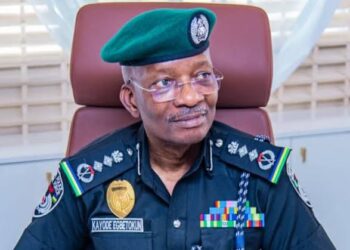With a firm knowledge of Nigeria’s internal security struggles and legitimate concerns of the over 200m citizens, President Bola Ahmed Tinubu, during his swearing-in ceremony at the Eagle Square on May 29, 2023, gave a snippet, a pointer of some sort, to his administration’s determination to overhaul the security architecture of the country.
The President’s words were direct and devoid of any ambiguity, and I quote: “Security shall be the top priority of our administration because neither prosperity nor justice can prevail amidst insecurity and violence. To effectively tackle this menace, we shall reform both our security DOCTRINE and its ARCHITECTURE (my emphasis). We shall invest more in our security personnel, and this means more than an increase in number. We shall provide better training, equipment, pay and firepower.”
To align with the president’s vision, the Nigeria Police Force (NPF) will require a police chief with intellectual profundity, professional capability and an immense fecundity of strategic ideas and tactics which are not just basic requirements but eminently essential tools.
President Tinubu’s choice of Acting IGP Kayode Adeolu Egbetokun ticks all the essential boxes. His emergence is no surprise to many who have followed his career as a police officer.
Educational and professional versatility:
Ag. IGP Egbetokun obtained a B.Sc. degree in Mathematics (1987), an M.Sc. in Engineering Analysis (1996) from the University of Lagos and a Certificate in Electronic Data Processing/Computer Programming. He also holds a Post Gradate Diploma in Petroleum Economics from Delta State University, Abraka (2000), an MBA from the Lagos State University (2004), capping it with a PhD in Peace and Security Studies from the Al-Hikmah University, Ilorin, Kwara state.
Since enlisting in the Nigeria Police on March 3, 1990, as a Cadet Assistant Superintendent of Police (ASP), he has served in various commands, departments and formations across the country. In 1999, as a Deputy Superintendent of Police (DSP), he was appointed Chief Security Officer to the Lagos state Governor and later, Commander, Rapid Response Squad (RRS). He has also served as Officer-in-Charge, Anti-Fraud Section, FCT Police Command, Abuja; Chief Superintendent of Police (CSP) (Admin), Lagos state Police Command; Area Commander, Osogbo and Gusau in Osun and Zamfara states, respectively, and Squadron Commander, MOPOL 5, Benin.
He was also Commandant, Police Training School, Ikeja; Deputy Commandant, Police College, Ikeja; Commissioner of Police (CP), SERVICOM, Force Headquarters; CP, Explosive Ordnance Disposal (EOD), Force Headquarters; CP, Kwara State Police Command, Ilorin; CP, Medical (Admin), Falomo, Lagos; Assistant Inspector General of Police (AIG), Zone 7 Headquarters, Abuja, and Deputy Inspector General of Police (DIG), Force Criminal
Investigation Department, Force Headquarters, Abuja.
Nigeria Police and the Nation’s Security Sector Governance:
In his inaugural address to his officers, the new Ag. IGP Egbetokun signalled his intention to dramatically change the face of policing in the country by forging relevant collaboration between the NPF and other sister security agencies.
He declared: “As the Inspector General of Police, I firmly believe that our path to a brighter future lies in collaboration, transparency, and the reformation of our law enforcement delivery system”.
Similarly, during the IGP’s visit to the National Security Adviser on July 11, 2023, he reechoed his call for security agencies to work closely together to defeat the criminal elements in the country. The IGP pledged to work assiduously to consolidate the influence of the Force in internal security, making the Force more visible, more effective and more proactive in internal security management in the country through robust internal re-engineering within the police system.
Resurgence of Police Mobile Force (PMF):
The deployment of the military to Internal Security Operations (ISO) for domestic security infractions has been on since the era of military rule. Their deployment to tackle internal disturbances has unfortunately led to the neglect of the Police Mobile Force. This critical unit which embodies the capacity and capability of the Force to perform high-magnitude paramilitary Internal Security Operations has sadly been underfunded and underutilised for decades.
Established in 1961, the Nigerian Mobile Police Force, popularly known as MOPOL Force, is the Nigeria Police well-known for its military-style operations. It has a personnel strength of 40,000 men deployed to 79 Police Mobile Squadrons located across the 36 states and the Federal Capital Territory (FCT). In domestic crisis, the PMF has been used successfully to tackle criminal elements across the country. Of note is its deployment against terrorism especially during the 1977-1982 Maitatsine riots in Kano, Kaduna and in other locations. They have also been used in the United Nations, ECOWAS, Africa Union and other peacekeeping operations across the world.
As a product of the Squadron Commander/Combat Operations Course, PMF Training College (Desert Camp Gwoza, Forest Camp Ila) who has served as Squadron Commander of MOPOL 5 Benin, IGP Egbetokun’s love and enchantment for the PMF has been conspicuous since assuming office.
Significantly, in his inaugural conference, the IGP announced the establishment of “a specialised Quick Intervention Squad, comprising combat-ready Police Mobile Force personnel with effective and enhanced training in crisis de-escalation and violent crime reduction strategies. This will lead to a review of the engagement patterns of the Police Mobile Force in a bid to restore the glory days of the Police Mobile Force as a power-packed arm of the Police.”
Ag. IGP Egbetokun’s intention, it is believed, is to withdraw mobile policemen from guard and escort duties to form the 40,000-personnel Quick Intervention Squad (QIS) and deploy them to de-escalate domestic crises and violent crimes.
A release issued by the Force Public Relations Office stated that the IGP is scheduled to withdraw Mobile Policemen assigned to protect VIPs in order “to optimise the allocation of resources and enhance the efficiency of the Force in its core mandate of safeguarding the lives and properties of all citizens.”
Community Policing for Enhanced Crime Prevention:
The Federal Government launched the Nigeria Community Policing Project on April 27, 2004. The adoption of community policing in the country was to address the gap between the nation’s policing realities and needs.
“We will embark on an ambitious and visible programme of community policing. We recognise that the true measure of our success lies in the safety and well-being of our communities,” the IGP noted.
Ag. IGP Egbetokun’s command of the Rapid Response Squad, an anti-crime security outfit in Lagos, between 2005 and 2007, provided an ample opportunity to interact with communities and leaders while working to secure the state. As the new Police Chief, Egbetokun will strive to achieve similar successes by replicating the same model of community policing across the nation. He has pledged to forge stronger ties between the police and the public, fostering an environment of mutual trust and cooperation. Regular citizen engagements and community interaction programmes designed to create meaningful dialogue and collaboration opportunities are also on his card.
Modern Policing Technologies:
Ag. IGP Egbetokun, a trained scientist, is expected to focus a lot of attention on improved policing efforts by taking advantage of available technologies for modern-day policing. He stated this much in his inaugural address: “We will also adopt a technology-driven approach to law enforcement, leveraging modern tools and techniques to ensure the effective and efficient deployment of our resources.”
Under the new Inspector General of Police, the Nigeria Police will continue to explore and deploy technologies needed to gather intelligence, track criminals and assist in investigations. More spirited efforts will definitely be made to enhance the capacity of the Force to capture crime data and improve its relevance in day-to-day investigations.
Shina Phillips is a leading security expert based in Abuja.




